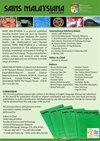海洋水黾 Halobates hayanus(异形目,鳉科)的系统组织学
IF 0.8
4区 综合性期刊
Q3 MULTIDISCIPLINARY SCIENCES
引用次数: 0
摘要
采用组织学方法研究了泰国利邦岛出产的Halobates hayanus的器官结构和细胞类型。该物种的皮肤系统由三层组成:外皮层、外皮层和内皮层。整个身体的肌肉系统只包括骨骼肌。在排泄系统中,我们发现了四个完全形成的马氏管(Malpighian tubules),每个管内都有直立的立方体上皮,内含分泌颗粒。消化系统包括前肠、中肠和后肠。中肠有三种不同的细胞类型:基底细胞、上皮细胞和吸收细胞。神经系统由两个区域组成:腹神经索和额神经节,额神经节与眼睛结构相连。额叶神经节由两个叶片组成,每个叶片包含外皮层和内髓质。外皮层有神经分泌细胞、神经胶质细胞和神经元。神经分泌细胞较大,胞质中含有分泌颗粒。这项组织学研究还显示了这种蛇蜥的生殖系统,包括生殖道和附属器官。本文章由计算机程序翻译,如有差异,请以英文原文为准。
Systemic Histology of the Marine Water-Strider Halobates hayanus (Heteropera, Gerridae)
The structure and cell types of the organs of Halobates hayanus from Libong Island, Thailand, were investigated using a histological method. The integumentary system of this species consists of three layers: epicuticle, exocuticle, and endocuticle. Throughout the body, the muscular system exclusively included skeletal muscle. In the excretory system, we found four fully formed Malpighian tubules, each one lined with a straightforward cuboidal epithelium harbouring secretory granules. The digestive system comprised a foregut, midgut, and hindgut. The midgut had three distinct cell types: basal cells, epithelium, and absorptive cells. The nervous system comprised two regions: A ventral nerve cord and a frontal ganglion, which is connected to the eye structure. The frontal ganglion was composed of two lobes each containing an outer cortex and inner medulla. The outer cortex presented neurosecretory cells, neuroglia cells, and neurons. The neurosecretory cells were large and contained secretory granules in their cytoplasm. This histological study also showed the reproductive system of this gerrid species, including the reproductive tract, and the accessory organ.
求助全文
通过发布文献求助,成功后即可免费获取论文全文。
去求助
来源期刊

Sains Malaysiana
MULTIDISCIPLINARY SCIENCES-
CiteScore
1.60
自引率
12.50%
发文量
196
审稿时长
3-6 weeks
期刊介绍:
Sains Malaysiana is a refereed journal committed to the advancement of scholarly knowledge and research findings of the several branches of science and technology. It contains articles on Earth Sciences, Health Sciences, Life Sciences, Mathematical Sciences and Physical Sciences. The journal publishes articles, reviews, and research notes whose content and approach are of interest to a wide range of scholars. Sains Malaysiana is published by the UKM Press an its autonomous Editorial Board are drawn from the Faculty of Science and Technology, Universiti Kebangsaan Malaysia. In addition, distinguished scholars from local and foreign universities are appointed to serve as advisory board members and referees.
 求助内容:
求助内容: 应助结果提醒方式:
应助结果提醒方式:


